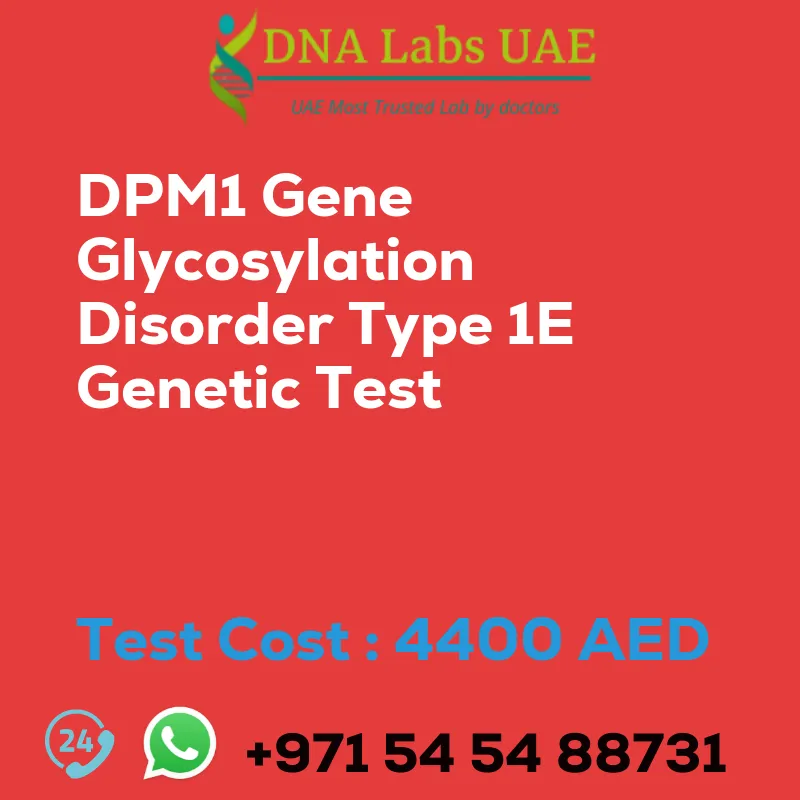DPM1 Gene Glycosylation Disorder Type 1E Genetic Test
Test Name: DPM1 Gene Glycosylation Disorder Type 1E Genetic Test
Components: DNA Labs UAE offers this test at a price of 4400.0 AED.
Sample Condition: Blood or Extracted DNA or One drop Blood on FTA Card
Report Delivery: 3 to 4 Weeks
Method: NGS Technology
Test Type: Metabolic Disorders
Doctor: General Physician
Test Department: Genetics
Pre Test Information: A Genetic Counselling session is recommended to draw a pedigree chart of family members affected with Glycosylation Disorder Type 1E.
About DPM1 Gene Glycosylation Disorder Type 1E
The DPM1 gene is responsible for producing an enzyme called dolichol-phosphate-mannose synthase, which is crucial for protein glycosylation. Glycosylation is the process of attaching sugar molecules to proteins, which is important for their proper folding, stability, and function. A mutation in the DPM1 gene can lead to a glycosylation disorder known as type 1E.
Symptoms of this disorder include developmental delay, intellectual disability, seizures, abnormal facial features, and skeletal abnormalities. The severity of symptoms can vary among affected individuals.
NGS Genetic Testing for DPM1 Gene Glycosylation Disorder Type 1E
NGS (Next-Generation Sequencing) genetic testing is a technique used to analyze the DNA sequence of genes. In the case of DPM1 gene glycosylation disorder type 1E, NGS genetic testing can identify mutations or variations in the DPM1 gene that may be responsible for the disorder.
This testing can help in confirming a diagnosis, understanding the genetic cause of the disorder, and providing information for genetic counseling and family planning. During NGS genetic testing, a small sample of the patient’s DNA, usually obtained from a blood sample, is sequenced using high-throughput sequencing technology. The DNA sequence data is then analyzed to identify any mutations or variations in the DPM1 gene.
This information can help in understanding the genetic basis of the disorder and potentially guide treatment options or management strategies. It’s important to note that NGS genetic testing for DPM1 gene glycosylation disorder type 1E is typically performed by specialized genetic testing laboratories and requires a healthcare professional to order the test. Genetic counseling is often recommended before and after testing to provide information and support to individuals and families undergoing genetic testing.
| Test Name | DPM1 Gene Glycosylation disorder type 1E Genetic Test |
|---|---|
| Components | |
| Price | 4400.0 AED |
| Sample Condition | Blood or Extracted DNA or One drop Blood on FTA Card |
| Report Delivery | 3 to 4 Weeks |
| Method | NGS Technology |
| Test type | Metabolic Disorders |
| Doctor | General Physician |
| Test Department: | Genetics |
| Pre Test Information | Clinical History of Patient who is going for DPM1 Gene Glycosylation disorder type 1E NGS Genetic DNA Test A Genetic Counselling session to draw a pedigree chart of family members affected with Glycosylation disorder type 1E |
| Test Details |
The DPM1 gene is responsible for producing an enzyme called dolichol-phosphate-mannose synthase, which plays a crucial role in a process called protein glycosylation. Glycosylation is the attachment of sugar molecules to proteins, which is important for their proper folding, stability, and function. A mutation in the DPM1 gene can lead to a glycosylation disorder known as type 1E. This disorder is characterized by a wide range of symptoms, including developmental delay, intellectual disability, seizures, abnormal facial features, and skeletal abnormalities. The severity of symptoms can vary widely among affected individuals. NGS (Next-Generation Sequencing) genetic testing is a technique used to analyze the DNA sequence of genes. In the case of DPM1 gene glycosylation disorder type 1E, NGS genetic testing can identify mutations or variations in the DPM1 gene that may be responsible for the disorder. This testing can help in confirming a diagnosis, understanding the genetic cause of the disorder, and providing information for genetic counseling and family planning. During NGS genetic testing, a small sample of the patient’s DNA, usually obtained from a blood sample, is sequenced using high-throughput sequencing technology. The DNA sequence data is then analyzed to identify any mutations or variations in the DPM1 gene. This information can help in understanding the genetic basis of the disorder and potentially guide treatment options or management strategies. It’s important to note that NGS genetic testing for DPM1 gene glycosylation disorder type 1E is typically performed by specialized genetic testing laboratories and requires a healthcare professional to order the test. Genetic counseling is often recommended before and after testing to provide information and support to individuals and families undergoing genetic testing. |








